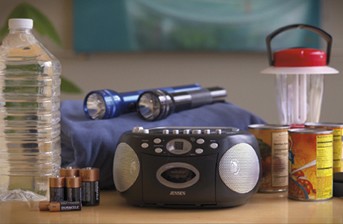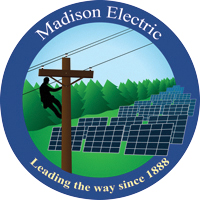Outages & Safety
| After Hours Emergency Numbers: | ||||
| OFFICE: | (207) 696-4401, Ext. 245 | Scott Lloyd | (207) 431-1888 | |
| PAGER: | (207) 508-2325 | Marty Berry | (207) 431-1092 | |
If you have a power issue please call (207) 696-4401, Ext. 245. This goes to the Duty Lineman.
This is the fasted way to have your issue addressed. Calling direct numbers does not get a quicker response. At times, we are busy restoring the power and answering the phone slows down the restoration time.
Outages
Be prepared for a power outage by keeping necessary items centrally located in your home. Periodically check your kit to see that batteries operate properly. The following is a list of items that are suggested to keep on hand:
- Flashlights
- Battery-operated radio and/or clock
- Extra batteries
- Containers of bottled water
- Canned, freeze-dried or dehydrated food, powdered milk, baby supplies for infants
- Non-electric can opener
- List of important phone numbers
- First-aid kit
- Glow sticks (great for the kids and don’t require batteries!)

Food Alerts
Do not refreeze melted ice cream, yogurt, seafood, or food that has thawed completely and been held above 40 degrees for two hours or longer. A general rule on food spoilage is, “If in doubt, throw it out.”
If you have any questions about the safety of thawed or defrosted foods, you can call the U.S. Department of Agriculture‘s toll-free “Meat and Poultry Line” at 1-800-535-4555.
Garage Doors
Electric garage doors may be opened by disengaging the drive mechanism. Methods used to do this vary from manufacturer to manufacturer. Please consult your operating instructions supplied by the manufacturer. They will tell you how to disengage the drive mechanism so that you can open the door manually. If you do not have a manufacturer’s instruction book, call the company that installed the doors.
Water Pipes
Keep your pipes from freezing by shutting off the valve that allows water to come into your home. Then, open any drain valves and all faucets and let them run until the pipes are empty (it’s helpful to identify these valves in advance). Next, flush all toilets and pour denatured alcohol into toilets and sinks to prevent water in the traps from freezing. Do NOT use automotive antifreeze in case there’s trouble with your water system; you don’t want the antifreeze to contaminate your drinking water. You may, however, use nontoxic antifreeze that’s made for winterizing motor homes.
Turn off the furnace emergency switch. Then drain your furnace boiler by opening the valve at the bottom (this looks like a garden faucet). Also, open all radiator vents. Be sure the boiler is filled with water again before it is restarted.
The tank of your electric water heater will keep water warm for the first few days after an outage. However, it can freeze after prolonged cold and should be drained after three days of below freezing temperatures.
Medical Problems
Find out about local shelters ahead of time if you have a medical problem. If you are ill or frail, consider staying with relatives if the outage will be lengthy.
If a member of your household relies on electric equipment for a life-threatening medical condition, we suggest a back-up plan to provide the patient with alternative facility care in case of a prolonged outage.
If you have medication that requires refrigeration, check with your pharmacist for guidance on proper storage during an extended outage.
Pets
Smaller pets such as fish, birds and reptiles may be endangered. Since many of these animals are fragile, we recommend that you do not wait until an outage strikes to devise alternate arrangements.
Check with a reputable pet store to determine what steps you can take before and during an outage to ensure your pet’s survival.
Appliances
Before a storm you might set your refrigerator and freezer to their coldest settings (but remember to reset them afterwards). It’s a good idea to place plastic containers filled with water in your freezer because ice helps maintain the cold during outages.
During a major outage, try not to open the refrigerator or freezer doors any more than necessary. If the unit’s door is unopened, food stays in a full refrigerator for up to 24 hours and in a freezer up to approximately 48 hours if it’s well packed; approximately 24 hours if it’s half packed. You might load up a cooler with ice and store food you’ll need during the first day or so after an outage.
When an outage occurs, turn off most appliances to prevent an overload on the electrical system once the power is restored. You may choose to leave your refrigerator and freezer on.
Thunderstorms
Thunderstorms might bring dangerous lightning, damaging winds, and flooding. While they occur mostly in the spring and summer months – primarily in the afternoon and evening hours – severe thunderstorms can happen almost any hour and any time of year. It is important to:
Be prepared
- Check local weather forecasts.
- Watch for warning signs of an approaching storm.
- Plan ahead – know where you will take shelter in case of a storm.
Know what to do:
- Stay indoors. If a suitable building is not available, get inside a vehicle with a steel roof. Do not take shelter in small sheds, under isolated trees, or in convertible automobiles.
- Stay away from tall structures such as towers, fences, telephone poles, or power lines and avoid contact with water, appliances, metal objects, or other conductors of electricity.
- Boaters and swimmers should immediately go ashore and take shelter, well away from the water.
- In the woods, take shelter under shorter trees. Make yourself the smallest target possible. Squat low to the ground on the balls of your feet with your head between your knees. Do not lie flat.
- At home, do not take a shower or bath. Current from a lightning strike can travel through water pipes.
- Do not talk on a hard-wired telephone. Telephone lines can conduct electricity, too.
- Unplug air conditioners and other major appliances to protect them from lightning strikes.
Downed Power Lines
 Stay safe around downed power lines
Stay safe around downed power lines
Touching a live power line can cause serious injury or death. You can’t tell just by looking whether a line is “hot” or not. Even if a downed line isn’t actively sparking, always assume it is carrying electricity. If you see a power line on the ground or hanging lower than normal:
- Don’t go near the wire, the pole or anything the wire is touching. Always assume a downed wire is carrying electricity, which can severely injure or kill you.
- Call us immediately
- Warn others to stay away until help arrives. Keep pets away, too.
If for some reason you are unable to report the downed line to us, contact your local police or fire department.
Other tips for staying safe around downed power lines:
- If a downed line is near water – even a small puddle – keep well away.
- Be careful not to stand under damaged tree limbs or power lines. Tree limbs can become weakened during a storm but not fall until several hours, even days, later. The same can be true for damaged power lines or poles.
- Don’t drive over downed power lines.
- Downed power lines that come in contact with a vehicle create a dangerous situation. Do not touch the vehicle. If you have a cellular phone, call us or the local police or fire department to report your situation.
Pay Your Bill Online
Madison Electric Works is excited to offer customers an easy and secure way to view, print, and pay their electric bill online.
